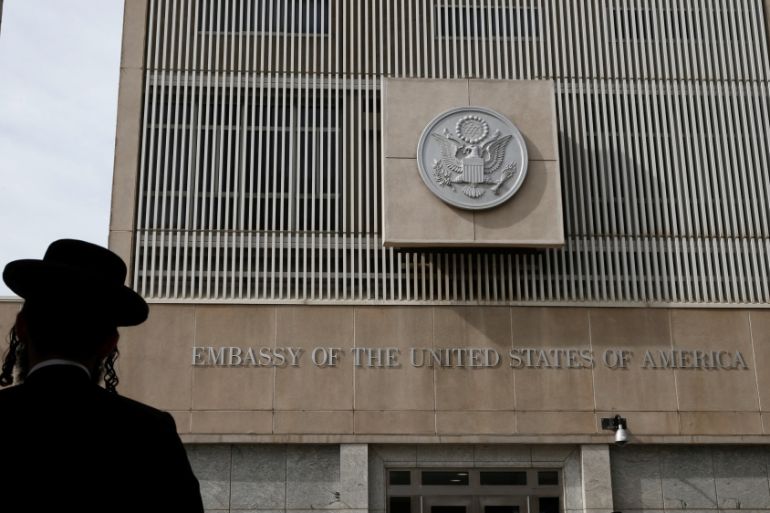The US embassy’s move to Jerusalem won’t happen soon
Israel may choose to trade Trump’s offer to move the US embassy to Jerusalem for a yet to be known political advantage.

Signs coming from Washington seem to point out that the intended decision to move the United States embassy from Tel Aviv to Jerusalem might not be implemented so quickly. But this should not be a reason for complacency.
In fact, if the embassy is not moved, such a decision might be the outcome of a backroom dealing which may result in a US policy even more biased towards Israel than has been seen from Washington for decades.
Keep reading
list of 4 itemsFrance blames Azerbaijan for New Caledonia violence: Unpacking their spat
‘Hell on Earth’ as violence escalates in Sudan’s el-Fasher
South Korean military says North Korea test-fired ‘ballistic missiles’
While Israelis are very much in favour of obtaining legitimacy for their insistence that the unified Jerusalem is Israel’s capital forever, the embassy move is more of a priority for Donald Trump than it is for Israel.
Speaking at a Washington, DC, event last December, Israel’s Defence Minister Avigdor Lieberman didn’t list the embassy issue as one of Israel’s top priorities. Iran, the Palestinian issue, settlements and Syria were listed by him as his country’s “focal points.”
|
|
Unlikely to be soon
The fact that the embassy decision wasn’t going to made early on in the Trump administration became clear in the public statements emanating from Washington. The White House spokesman Sean Spicer was asked three times about the issue during his first briefing, but he repeatedly answered that “no decision” was made on this issue.
Perhaps the most obvious signal came from the person in line to become the US ambassador to Israel – or as some Israeli settlers said Israel’s ambassador to the US – David Friedman, Trump’s bankruptcy lawyer who is a pro-settlements American Jew. He has said that he plans to live in Jerusalem regardless of where the embassy will be located.
Statements against the move came from the 70 countries attending the Paris peace conference on January 15 and from Jordan’s King Abdullah, who met Palestinian President Mahmoud Abbas in Amman to drive home this message.
A delay by Washington regarding the embassy’s move might also be helpful to one of Trump’s closest advisers. The job of President Trump’s son-in-law Jared Kushner, who was appointed as a peace envoy earlier this month, would certainly have become more difficult had the newly elected US president made a rash decision on the issue of the very sensitive status of the holy city.
Both Israelis and Palestinians have welcomed – albeit the latter cautiously – Kushner’s appointment.
The issue is not dead
The Jerusalem Embassy Act became law in the US in 1995 (PDF). It calls for the embassy to be moved unless the president feels it could harm US national security.
Continuous Republican and Democratic presidents have taken this route. Former US President Barack Obama signed a six-month waiver early in December 2016, practically denying any change on the issue until next June.
Palestinians must continue to oppose unilateral Israeli and US moves that can negatively affect the final outcome of any future talks, but they need to look inward at the same time.
While Palestinians and others may have breathed a sigh of relief, the issue is certainly not dead and will not easily go away.
However, what is most worrisome is that the Israelis are most probably willing to trade off this issue for a yet to be known political advantage. It is very likely that Israel will approve a deal by the Trump administration that could keep the status quo regarding the embassy in return for an even more favourable US position towards Israel.
A sign of such a possibility was evident on the second working day of the Trump administration. When the White House press secretary was asked to comment on the Israeli decision to build new settlements in Jerusalem and other parts of the West Bank, he refused to take a stand.
Israeli media has reported that US-Israeli issues will be addressed during the upcoming summit between Trump and Benjamin Netanyahu in February. No doubt handlers and aides will be planning whatever deals Israel wants before that meeting.
National unity needed
Palestinians have very low expectations in regards to the Trump administration, which has not given many positive signals regarding a neutral US position on the Arab-Israeli conflict, despite the claims by Trump at one time that his administration would try to be neutral.
Palestinians must continue to oppose Israeli and US moves that can negatively affect the final outcome of any future talks, but they need to look inwards at the same time.
The decision to move the US embassy from Tel Aviv to Jerusalem may have been temporarily delayed, but there is no guarantee that it will not be implemented in the coming months.
READ MORE: Trump’s embassy move to Jerusalem ‘self-destructive’
To stop the embassy move and any other deals that the Israelis and Americans might come up with, concerted effort must be made to make the Israeli occupiers pay a price for their continued violations of international law and their rejection of binding UN Security Council resolutions such as the latest in December 2016, which demanded halting the settlement activity.
Palestinian national unity must be given the highest priority now, followed by an agreed and practical strategy for accomplishing Palestinian national aspirations.
This unity can then be leveraged to produce Arab and international support that together can help block any Israeli or US efforts to impede the right of Palestinians to determine their future on their land.
Daoud Kuttab, an award-winning Palestinian journalist, is a former Ferris professor of journalism at Princeton University.
The views expressed in this article are the author’s own and do not necessarily reflect Al Jazeera’s editorial policy.
